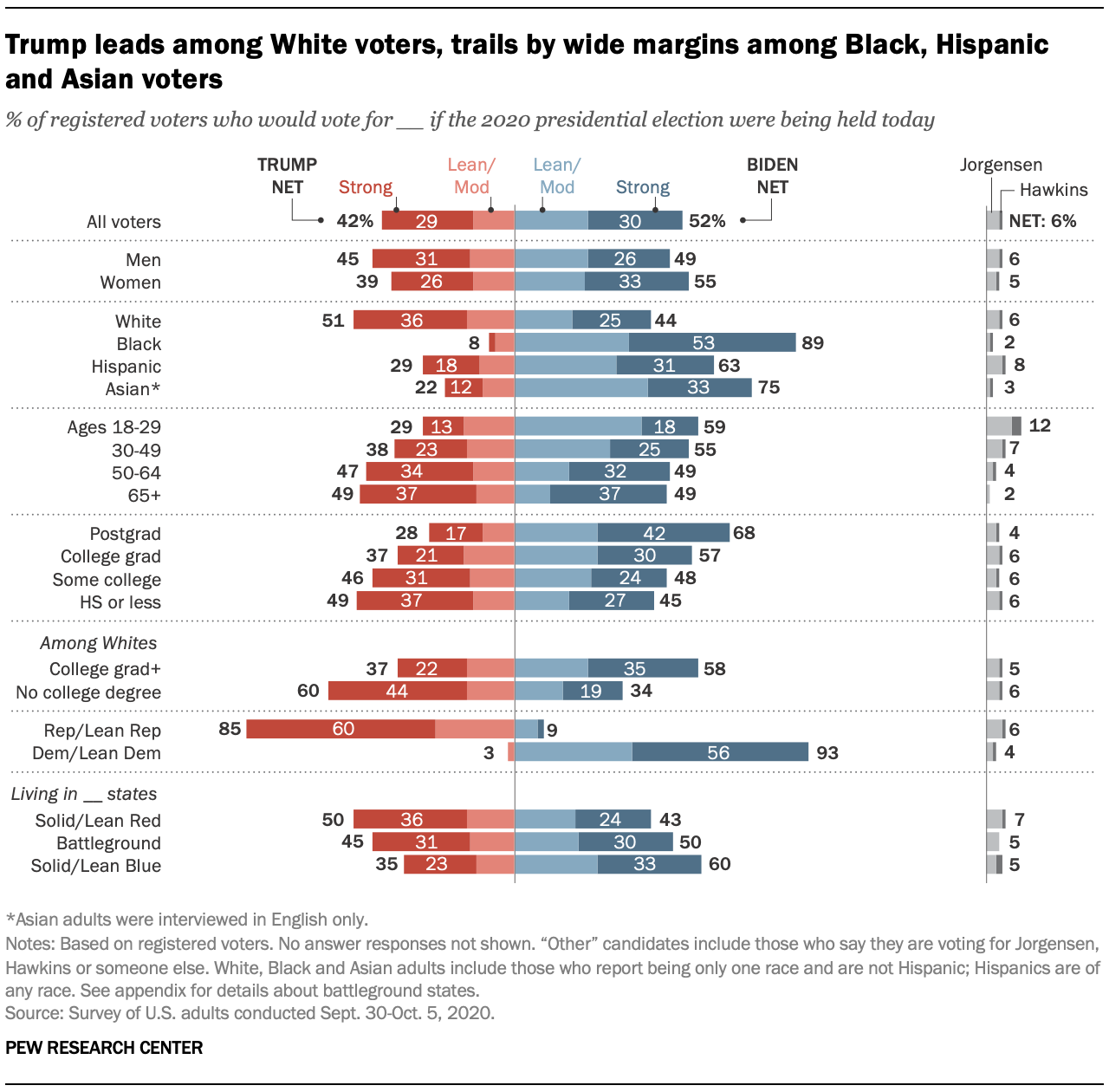With less than a month to go before the Nov. 5 Presidential election day, Asian Americans and other communities of color are showing a strong preference for Joe Biden over Donald Trump.
According to a poll by the Pew Research Center, Biden holds a 10 percentage point lead over Trump among registered voters in the presidential race (52% Biden, 42% Trump).
Many of the demographic patterns of support for both candidates are similar to those in the 2016 presidential contest
There are sizable gaps by race and ethnicity. White voters appear to be split, preferring Trump to Biden (51% vs. 44%, respectively), though Biden is faring slightly better among White voters in the current race compared to Hillary Clinton in 2016.READ the full report.

Just as was the case in 2016, there is a sizable gender gap in candidate preference: Women voters continue to favor the Democratic candidate for president by 17 percentage points (55% to 39%).
However men are almost evenly split. Today, 49% favor Biden while 45% favor Trump. In 2016, men favored Trump by modest margins in preelection polls, as well as among validated 2016 voters.
There continue to be large gaps in candidate preference by education. As in 2016, those with a college degree or more are more likely to support Biden over Trump. Today, those with no college degree are slightly more divided: 47% say they would vote for Trump if the election were held today, while 46% say they would vote for Biden.
Education is also a dividing line among White voters: College-educated White voters favor Biden by 21 percentage points, while those without a college degree favor Trump by a similar margin.
Among other key findings from the report:
• At a time of deep political divisions and partisan antipathy, voters are far more likely to express confidence in Biden than Trump to unify the country. Half of voters (50%) say they are confident in Biden to “bring the country closer together,” compared with just 30% who express confidence in Trump.
• Voters have similar levels of confidence in Trump and Biden on the economy. About half of voters (52%) express confidence in Trump to make good decisions about economic policy, one of the highest shares expressing confidence in the president on any of the six issues on the survey. However, about as many voters (51%) have confidence in Biden on the economy. Confidence in Biden to make good decisions about economic policy has risen modestly since June (48% then vs. 51% today).
• Since summer, there has been some improvement in views of the nation’s economy. Among all voters, 35% say economic conditions are excellent or good, up from 28% in June. However, this change has come almost entirely among Trump supporters and the gap in economic perceptions has grown much wider: Two-thirds (67%) of Trump supporters now say that economic conditions are excellent or good, compared with 51% who said this in June. Just 11% of Biden supporters view economic conditions positively, which is little changed from four months ago (9%).
• Voters view Biden much more positively than Trump for compassion, honesty and being a good role model. Nearly twice as many voters say “compassionate” describes Biden very or fairly well than say it applies to Trump (67% vs. 34%). More than half of voters (53%) say Biden is honest, compared with 35% who describe Trump as honest. And far more voters say Biden is a good role model (54% vs. 28%). Among six personal traits included in the survey, Trump holds his widest edge in standing up for his beliefs: 69% say this describes Trump very or fairly well, compared with 61% who say it describes Biden well.
• While voters on both sides share a sense of the importance of the election, they also share concern about the country’s future if the opposing candidate wins. Fully 89% of Trump supporters say that if Biden wins, they not only would be very concerned over the country’s direction, they believe it would lead to “lasting harm” for the country. A nearly identical majority of Biden supporters (90%) say Trump’s election would result in lasting harm to the United States.
• There is a widespread sense among voters that if their candidate wins the election, the next president should primarily focus on the concerns of all Americans, not just those who voted for him. This view – like the belief that the country may face lasting harm if the opposing candidate wins – is shared widely among the supporters of both candidates. Fully 89% of Biden supporters and 86% of Trump supporters say that if their candidate is victorious, he should focus primarily on the concerns of all Americans, even if it means disappointing some of his supporters.
• A large majority of all registered voters (69%) say they are extremely motivated to vote in the presidential election; another 18% say they are very motivated to vote while 8% say they are somewhat motivated. Just 5% of registered voters say they are not too motivated or not at all motivated to vote in the presidential election. The shares of Trump and Biden supporters who say they are extremely motivated to vote also are strikingly similar: 71% of Trump supporters and 72% of Biden supporters say they are extremely motivated to cast ballots.
EDITOR'S NOTE: The margin of sampling error for the survey conducted Sept. 30-Oct. 5 on the Center’s American Trends Panel is plus or minus 1.5 percentage points for results based on the full sample of 11,929 respondents. (This survey was in the field when Trump announced on Twitter, early on the morning of Oct. 2, that he and First Lady Melania Trump had contracted COVID-19. There are no significant differences in voter preferences, or in confidence in the two candidates to handle the impact of the coronavirus, before and after his announcement.)


No comments:
Post a Comment